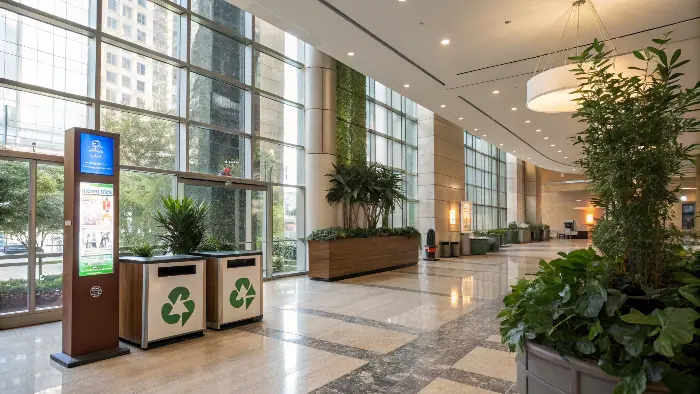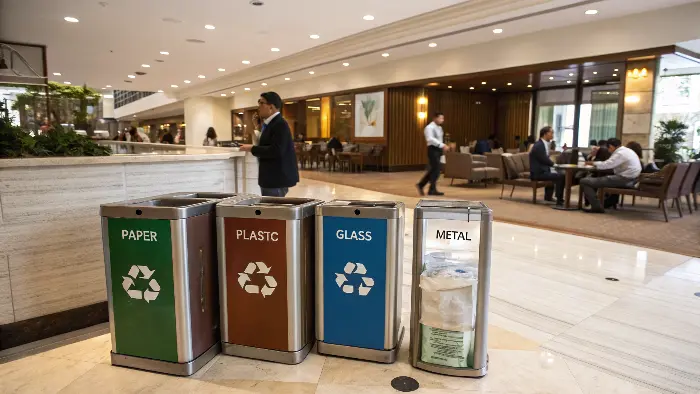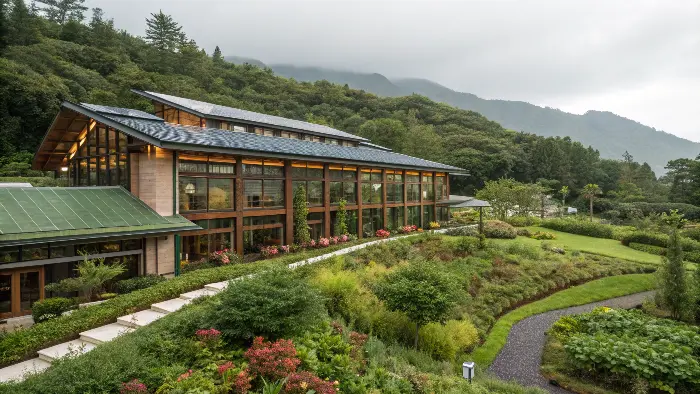Piles of plastic cutlery from hotel buffets? It’s a huge waste problem. But discover how smart hotels are now embracing eco-friendly tableware for zero-waste dining success – it’s happening!
Yes, hotels and resorts are increasingly adopting zero-waste dining by replacing single-use plastics with eco-friendly tableware like bamboo or compostable options. They also implement food waste reduction strategies and promote sustainable guest practices to achieve this. It’s a big, positive shift!
It’s really something, isn’t it? Seeing those big, beautiful resorts finally taking serious steps. I remember being on holiday a few years back – I won’t name names, but it was a lovely place – and just being horrified by the sheer amount of plastic waste at every single meal. Plates, cups, cutlery… mountains of it. But things are changing, and fast! So, if you’re wondering how they’re pulling this off and what it really means for the industry (and for us as consumers who care!), then you’re in the right place. This isn’t just a fleeting trend; it’s a real transformation. Let’s get into the nitty-gritty of how they’re making it work.
What is zero-waste in the hospitality industry, exactly?
"Zero-waste" sounds impossible, right? Especially in a bustling hotel with hundreds of guests. But it’s a clear goal: sending absolutely nothing to landfill, achieved through smart, practical steps.
Zero-waste in hospitality means designing and managing products and processes to systematically avoid and eliminate waste. It aims for no trash sent to landfills, incinerators, or the ocean, focusing heavily on prevention, reuse, and composting/recycling. It’s a total mindset change.
When I first heard "zero-waste" in a hotel context, I was skeptical, I’ll admit. I mean, how do you manage that with so many people, so many meals, so much… stuff? But the more I’ve worked with clients at Ecosourcecn on their tableware needs, the more I’ve seen it’s a journey, not an instant fix. It’s about fundamentally rethinking how things are done. Your insight about hotels "reducing food waste and promoting sustainable guest interactions" is spot on – that’s a huge part of it.
It’s not just about having good recycling bins, though that’s important. It’s about looking at the entire lifecycle of everything that comes into the hotel.
Core Ideas Behind Zero-Waste Hospitality:
- Prevention First: The best way to deal with waste? Don’t create it in the first place! This means things like sourcing items with minimal packaging, or offering digital newspapers instead of physical ones.
- Redesigning Systems: This is where smart menu planning comes in (like you mentioned!), ensuring minimal food scraps. It also means choosing suppliers who are on board with returnable packaging or bulk deliveries.
- Maximizing Resource Use: Can something be repaired instead of replaced? Can "waste" from one process become an input for another? For example, coffee grounds for the garden.
- The 5 R’s (or more!): Most people know Reduce, Reuse, Recycle. But zero-waste often expands on this to include Refuse (e.g., refusing unnecessary single-use items from suppliers), and Rot (composting organic matter).
For dining, this translates to a serious commitment. Think about it: eliminating single-use plastic straws and stirrers was just the beginning. Now, it’s about compostable plates made from bagasse, reusable napkins, and systems to ensure that any food waste is actually composted. I helped a resort in the Caribbean set up their composting for our PLA-lined hot cups, and the difference it made to their landfill output was amazing. It’s about building that circularity right into the operations.How can hotels be environmentally friendly, then?
Want a greener stay but unsure what to look for? Hotels face immense pressure to be eco-conscious. They achieve this through diverse strategies, impacting everything from energy usage to, you guessed it, waste.
Hotels become environmentally friendly by implementing wide-ranging sustainable practices. These include energy and water conservation, robust waste reduction programs (like eco-tableware!), sustainable sourcing for food and amenities, and actively educating guests about their green initiatives. It’s a full-circle approach, not just a single action.

Being environmentally friendly for a hotel is so much more than just putting a little card in the bathroom about reusing towels – though that’s a start! It’s a deep commitment that touches every part of their operation. I’ve seen some amazing examples firsthand. There was this boutique hotel I consulted for in Europe; they were really digging into every detail.
Your insights about "using compostable or reusable alternatives like bamboo cutlery, paper straws, and reusable trays" and "implementing smart menus, food waste monitoring, and waste sorting" are perfect examples of this in action. These aren’t just isolated tactics; they’re part of a bigger strategy.Key Areas Where Hotels Go Green:
- Energy Conservation: This is a big one. We’re talking LED lighting throughout the property, motion sensors so lights aren’t on in empty rooms, energy-efficient appliances (Energy Star rated), and even investing in renewable energy like solar panels. Some newer hotels are designed from the ground up with passive cooling and heating in mind.
- Water Stewardship: Low-flow showerheads and toilets are pretty standard now, but it also includes things like rainwater harvesting, recycling greywater for irrigation, and those linen reuse programs. Every drop counts, especially in water-scarce destinations.
- Waste Reduction & Management: This is where our eco-friendly tableware from Ecosourcecn plays a huge role! Beyond that, it’s comprehensive recycling programs, composting food waste (not just from guest plates, but kitchen prep too), and minimizing single-use plastics across the board – from those tiny shampoo bottles to water bottles. The "waste sorting" you mentioned is crucial for this to work.
- Sustainable Sourcing: This means looking at where everything comes from. Are the cleaning products eco-friendly? Is the food locally sourced and organic where possible? Are the textiles made from sustainable materials? For us, it means ensuring our bamboo or PLA products are from certified, responsible sources.
- Guest Engagement: Telling guests what the hotel is doing and how they can help. This can be through in-room information, interactive displays, or even staff proudly talking about their initiatives. It creates a shared sense of responsibility.
It’s this holistic view that truly defines an environmentally friendly hotel. It’s not just about being less bad; it’s about actively trying to be good.So, how can a hotel reduce, reuse, and recycle waste specifically?
Seeing overflowing bins at hotels is depressing, no? Waste is a massive operational and environmental challenge. But hotels are getting clever, using the classic "3 Rs" – reduce, reuse, recycle – with some seriously innovative twists.
Hotels reduce waste by minimizing packaging from suppliers and phasing out disposables. They reuse items like cloth napkins and glass carafes. Comprehensive recycling programs are set up for paper, plastic, glass, and metal, often with clear guest instructions and back-of-house diligence.

The 3 R’s – Reduce, Reuse, Recycle – are like the holy trinity of waste management, and hotels are finding some really smart ways to apply them. It’s not just talk; it’s action. I’ve seen firsthand how focusing on these three areas can make a massive difference. Your point about "smart menus, food waste monitoring, and waste sorting" fits perfectly here, especially in the "Reduce" and "Recycle" (or "Rot" for compostables) categories.
Let’s break it down:Reduce:
This is all about stopping waste before it even starts. It’s the most effective "R"!
- Amenity Management: Shifting from those tiny plastic bottles of shampoo and conditioner to larger, refillable dispensers. I remember a client hotel saying this one change alone cut their plastic waste from bathrooms by over 70%!
- Paperless Operations: Encouraging digital check-ins, e-folios, and offering newspapers/magazines digitally.
- Food Waste Vigilance: This is huge. Implementing "smart menus" that use ingredients across multiple dishes to minimize spoilage, accurate portion control to reduce plate waste, and "food waste monitoring" systems to track what’s being thrown away and why. Some hotels even use AI for this now – pretty cool!
- Packaging from Suppliers: Working with vendors to get deliveries in reusable crates or with minimal packaging.
Reuse:
Giving items a longer life, sometimes in creative ways.
- Dining Ware: This is Ecosourcecn’s bread and butter! Moving from single-use plastic or paper to durable, reusable options like ceramic plates, metal cutlery, and glassware. Or, for certain applications, high-quality, multi-use bamboo items or even some of the newer, robust compostable options that can handle a few careful washes before composting. Your mention of "reusable trays" is key for room service or poolside.
- Linens: Cloth napkins and tablecloths instead of paper. And when bed linens or towels get a bit worn, they can be repurposed as cleaning rags.
- Water Bottles: Providing guests with reusable water bottles and setting up water refill stations.
Recycle (and Rot/Compost):
Properly managing waste that can’t be reduced or reused.
- Clear Segregation: This is where "waste sorting" is essential. Having clearly labeled bins in guest rooms, public areas, and especially back-of-house where most waste is generated. This includes specific streams for paper, plastics (by type, if possible), glass, metal, and organics.
- Composting: This is a game-changer for hotels. Food scraps from kitchens and guest plates, plus any certified compostable tableware (like our bagasse or PLA items), can be turned into valuable compost. Some hotels even use this compost in their own gardens! It’s the ultimate circular solution.
I’ve seen hotels get really creative, like turning old uniforms into new items or donating leftover usable food (that’s safe and handled correctly) to local shelters. It’s a continuous effort, but the impact is undeniable.What is this "eco-friendly hotel model" everyone talks about, then?
Heard "eco-hotel" or "green hotel" but it often feels a bit vague, doesn’t it? What truly makes a hotel sustainable? It’s a holistic model integrating green practices across all operations, not just token gestures or a single initiative.
The eco-friendly hotel model integrates sustainability into its core business strategy and operations. This means eco-conscious design and construction, highly efficient operations (energy, water, waste), ethical and sustainable sourcing, strong community engagement, and transparently communicating efforts to guests and stakeholders, all aiming for minimal environmental impact and even positive contributions.

The "eco-friendly hotel model" isn’t just a buzzword; it’s a comprehensive approach. It’s about weaving sustainability into the very fabric of the hotel’s existence. It pulls together everything we’ve talked about – zero-waste ambitions, the 3 R’s, energy and water conservation – into one cohesive strategy. It’s less about a checklist and more about a philosophy. Your insight about hotels "promot[ing] sustainable guest interactions" is a key part of this, as it involves everyone in the mission.
Think of it like building a house. You need a strong foundation and all the parts need to work together.Pillars of the Eco-Friendly Hotel Model:
- Sustainable Design & Construction:
- Using locally sourced, recycled, or renewable building materials.
- Designing for energy efficiency (e.g., maximizing natural light, proper insulation).
- Incorporating green spaces, maybe even green roofs or living walls.
- Operational Excellence & Efficiency:
- Energy: Smart systems, renewable energy sources, regular energy audits.
- Water: Advanced water-saving fixtures, greywater recycling, rainwater harvesting.
- Waste: This is where zero-waste dining and comprehensive recycling/composting shine. Implementing "food waste monitoring" as you mentioned, and aiming for those high diversion rates from landfill. Using eco-friendly tableware from suppliers like us at Ecosourcecn is a very visible part of this pillar.
- Ethical & Sustainable Supply Chain:
- Prioritizing suppliers who share their eco-values. This means local and organic food, fair-trade coffee, chemical-free cleaning products, and, of course, sustainable amenities and tableware.
- Transparency in sourcing – knowing where things come from and how they’re made.
- Guest & Staff Engagement and Education:
- Making it easy and appealing for guests to participate (e.g., clear recycling instructions, information about the hotel’s initiatives).
- Thoroughly training staff so they understand the "why" behind the practices and can be ambassadors for sustainability. I’ve noticed staff are often the most passionate advocates when they’re empowered!
- Community & Ecosystem Stewardship:
- Supporting local businesses and artisans.
- Contributing to local conservation efforts.
- Minimizing impact on local biodiversity; some even actively work to enhance it with native plant gardens.
I worked with a resort in Southeast Asia that truly embodied this model. They had their own organic farm that supplied a good chunk of their restaurant’s produce, a sophisticated water treatment plant, and their staff were so knowledgeable and proud of their eco-efforts. They used our compostable bagasse tableware for beachside dining, and it all just fit. It felt authentic, not like a marketing gimmick. That’s the goal, isn’t it?Conclusion
Hotels are truly stepping up, transforming dining with eco-tableware and embracing zero-waste. It’s a journey, but one that’s making a real, positive impact on our planet. Inspiring!
- Sustainable Design & Construction:


